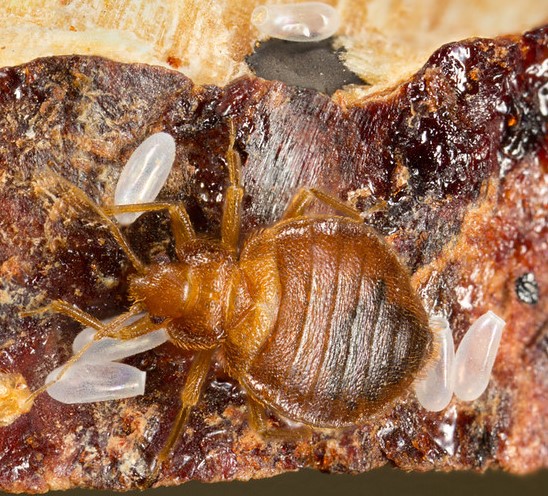
The results of an experimental study suggest bed bugs may be able to acquire and transmit methicillin-resistant Staphylococcus aureus (MRSA), researchers reported yesterday in the Journal of Infectious Diseases.
In the study, researchers from the University of South Dakota developed an experimental design that used a collagen membrane contaminated with MRSA to mimic the process of a bed bug blood feeding through the skin of a host colonized with MRSA. They then conducted three trials in which groups of 30 bed bugs were allowed to feed on sterile blood through the contaminated membrane until fully engorged and were analyzed for the amount of viable MRSA present on their bodies and internally for 7 days.
Analysis of 12 bed bugs on days 0, 3, and 7 post-exposure found that all acquired MRSA on their bodies and internally, with evidence from blood samples indicating proliferation of MRSA within the bed bugs following ingestion. MRSA remained viable on the bed bug surface for up to 3 days post-exposure in two of three trials and up to 7 days in one of three trials, and in the blood for up to 3 days post-exposure in all three trials and 7 days in one of three trials.
Evidence for transmission
To determine if the bed bugs could transmit MRSA, the researchers allowed 10 bugs that had been maintained for 7 days after the initial feeding to take a second blood meal through an uncontaminated membrane. Transmission of MRSA to the uncontaminated membrane was observed in two of three trials.
The study authors note that while previous studies have described the isolation of MRSA from bed bugs, evidence for their potential role in transmission has been lacking.
These results ... provide support for the hypothesis that bed bugs may contribute to the transmission of MRSA in some settings.
"These results do not prove that bed bugs are relevant vectors of MRSA in nature," the study authors wrote. "However, when considered together [with] the detection of MRSA in field-collected bed bugs and clinical reports associating bed bugs with Staphylococcus infections, they provide support for the hypothesis that bed bugs may contribute to the transmission of MRSA in some settings."
 Levels of metabolites were altered in long-COVID patients 2 years after infection, suggests a
Levels of metabolites were altered in long-COVID patients 2 years after infection, suggests a  A survey of infection consultants in the United Kingdom found support for the "subscription-style" antibiotic payment model launched in England in 2022, researchers reported today in JAC-Antimicrobial Resistance.
A survey of infection consultants in the United Kingdom found support for the "subscription-style" antibiotic payment model launched in England in 2022, researchers reported today in JAC-Antimicrobial Resistance.












